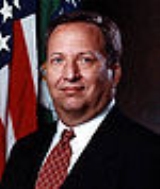
. He served as the 71st United States Secretary of the Treasury
from 1999 to 2001 under President Bill Clinton
. He was Director of the White House United States National Economic Council for President Barack Obama
until November 2010.
Summers is the Charles W. Eliot University Professor at Harvard University
's Kennedy School of Government. He is the 1993 recipient of the John Bates Clark Medal
for his work in several fields of economics.
Summers also served as the 27th President of Harvard University
from 2001 to 2006.
With uncertainty in oil markets, a buildup of speculative pressures and the large U.S. current account deficit, there is a real possibility that Paulson's crisis-management skills will be tested.![]()
I know that there is one additional thing that I've learned and that is that what Harvard does and says has an enormous resonance that goes beyond Zip code 02138.![]()
I deeply regret the impact of my comments and apologise for not having weighed them more carefully ... I was wrong to have spoken in a way that has resulted in an unintended signal of discouragement to talented girls and women.![]()
We must recognise that in an integrated world, trade cannot be divorced from other concerns. We need to promote free trade and serious global efforts with respect to common problems even as we support every nation's right to chart its own course.![]()
The situation in a number of countries reminds one that it's still a risky world out there in the emerging markets.![]()
Where countries have been able to carry through on their reform commitments -- as in Korea, Thailand and the Philippines -- results are starting to come in the form of lower interest rates, new investment and increased growth.![]()
No free country will ever again have anything like the 90 percent tax rates that we had in this country. Past a certain point, high marginal tax rates are, indeed, terribly destructive.![]()
Things take longer to happen than you think they will and then they happen faster than you think they will.![]()
Takeovers wouldn't cause the stock market to rise unless there is an upward reassessment of earnings (potential). People are more optimistic and confident about the future.![]()

